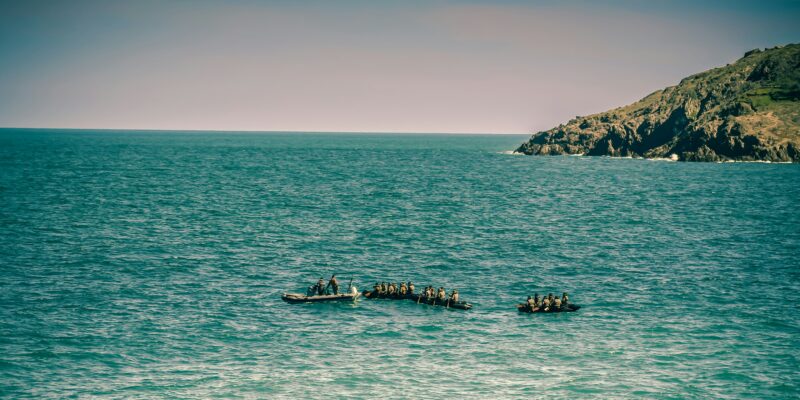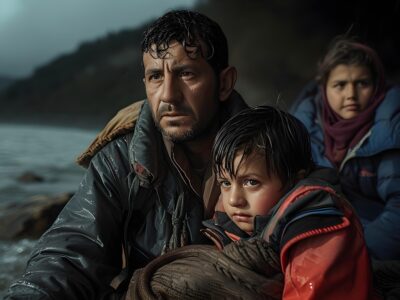20-10-2024
Innocenti Chiara
Europe Researcher,
Global Human Rights Defence.
On October 13th, international news outlets reported the opening of migration camps in Albania, making international headlines and triggering confusion over the operational aspects of this initiative. The development has also sparked debate on Italy’s management of migrants.
The Albania-Italy migration agreement, signed on November 6th, 2023, led to the establishment of two centres in Albania. The cities of Shengjin and Gjader have long awaited the opening of these facilities, which are now housing “irregular migrants.”
Under the Agreement, the targeted individuals are primarily male migrants arriving from Italy’s list of 22 “safe countries” of origin, which includes Kosovo, Morocco, Egypt, and Tunisia. The framework applies to those rescued outside Italy’s territorial waters, raising concerns that it may serve as a mechanism for outsourcing national accountability and facilitating preventive pushbacks. Migrants will be transported on Italian vessels, assessed for vulnerabilities at sea, and ultimately determined for disembarkation in Albania rather than Italy. Shengjin, located approximately 45 miles south of the country’s capital, Tirana, is designated as the initial hotspot for identification and fingerprinting. Gjader, a former air base fallen into disuse, will process international protection requests. The facilities can accommodate up to 3,500 people, with Gjader housing three distinct structures: one for asylum seekers (maximum 880 people), one for those slated for repatriation (maximum 144), and one for detainees committing crimes inside the structure (maximum 20). Both centres will operate under Italian jurisdiction, staffed by Italian personnel, with outside security provided by Albanese patrols.
Albanian Prime Minister Edi Rama has publicly expressed his acceptance of Italy’s proposal as a gesture of gratitude for Italy’s historical support during the 1990s. However, it is widely speculated that Albania aims to strengthen its ties with the EU amid its ongoing accession process, showing a willingness to assist with one of its most intractable issues. Italy, in turn, asserts that the agreement serves as a necessary deterrent for potential migrants seeking to enter Italy.
Despite the European Union Commission President Ursula von der Leyen welcoming the deal as a potential model for future cooperation on migration between EU and non-EU migration cooperation, the agreement has raised serious human rights concerns. The UN Refugee Agency promptly announced its intention to monitor the situation on-site for the first three months, raising alarms about the externalisation of asylum obligations, shifting responsibility, and the resulting risks of human rights violations, including indirect refoulement. Judith Sunderland, Human Rights Watch Deputy Director for Europe and Central Asia, criticised the agreement, emphasising that even “safe countries” may harbour severe human rights abuses.
In January 2024, Amnesty International highlighted inaccuracies and omissions in the agreement’s language. Under International Law, Italy is obligated to disembark rescued persons in a safe location “as soon as reasonably practicable,” which effectively excluded transfers to Albania. The two-day journey to Albania adds unnecessary suffering for migrants and limits the capacity of rescue ships operating in the Mediterranean. Additionally, the agreement fails to outline the procedures for identifying vulnerable individuals at sea, which requires specialised equipment, medical and psychosocial personnel, and sufficient time for thorough assessments, complicating rescue efforts.
There is also a significant risk that the right to liberty could be systematically infringed upon, as the deal mandates automatic detention for all individuals, with no clear timeframe for release, potentially exacerbating mental and physical distress. Furthermore, migrants’ inherent right to appeal asylum rejections and seek asylum may be severely limited due to the physical distance from relevant authorities and legal assistance, leading to misunderstandings and inadequate representation. Critically, the agreement lacks provisions for civil society involvement, raising concerns about the ability of human rights observers to access the centres without restrictions.
Finally, Dunja Mijatovic, Council of Europe Commissioner for Human Rights, warned that the lack of legal clarity could result in arbitrary and discriminatory treatment between asylum seekers processed in Albania and those in Italy, potentially violating the prohibition of discrimination. The Italy-Albania deal could also set a troubling precedent for future cooperation models. The situation in Gjader and Shengjin will be closely monitored by human rights organisations to ensure the enforcement of universal, inalienable, and indivisible human rights for migrants.
Sources and further reading:
(2024, October 17). Meloni presents Italy-Albania Deal at Brussels Meeting. Ansa. Retrieved on October 20, 2024, from:
https://www.ansa.it/english/news/politics/2024/10/17/meloni-presents-italy-albania-deal-at-brussels-meeting_c370d52e-b92c-4021-81fa-28c148a23089.html.








Comments